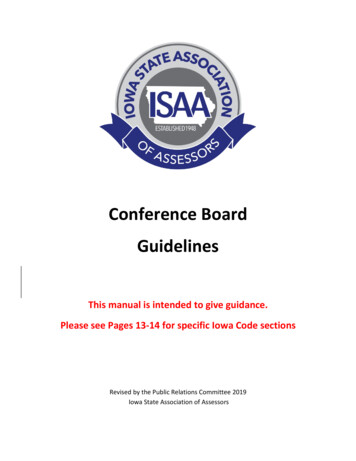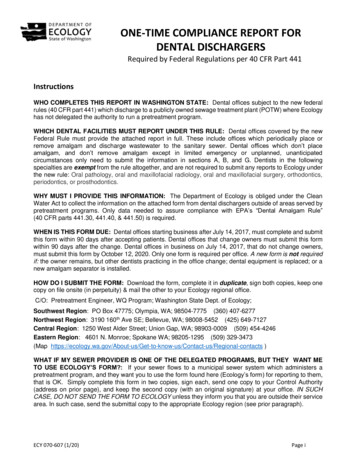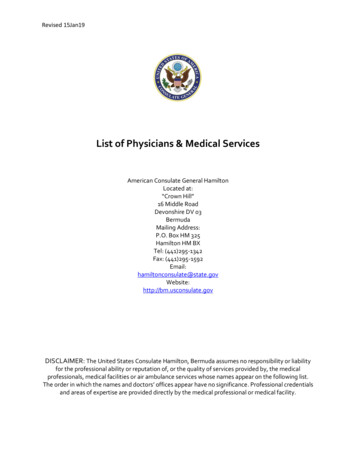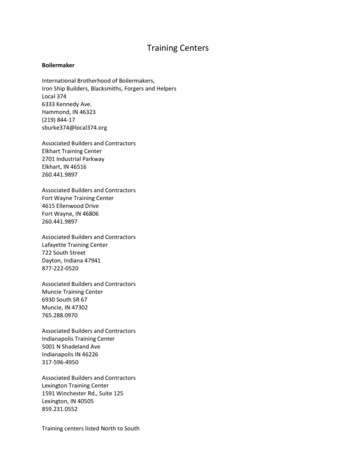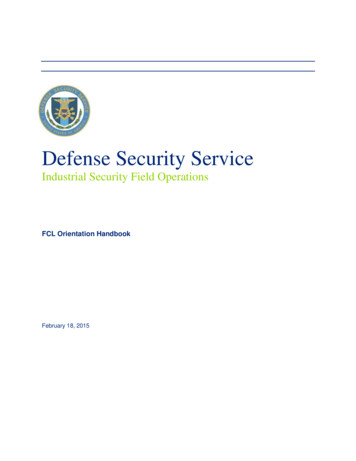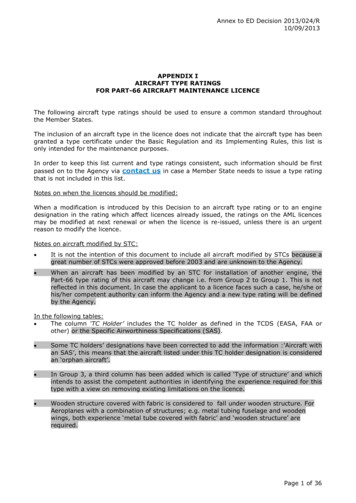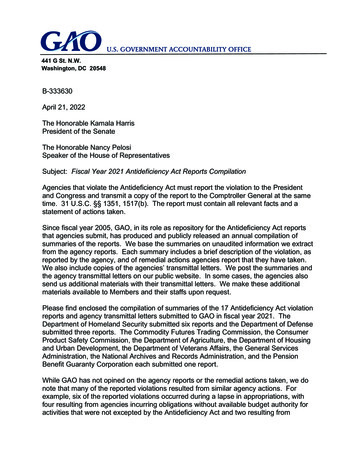
Transcription
441 G St. N.W.Washington, DC 20548B-333630April 21, 2022The Honorable Kamala HarrisPresident of the SenateThe Honorable Nancy PelosiSpeaker of the House of RepresentativesSubject: Fiscal Year 2021 Antideficiency Act Reports CompilationAgencies that violate the Antideficiency Act must report the violation to the Presidentand Congress and transmit a copy of the report to the Comptroller General at the sametime. 31 U.S.C. §§ 1351, 1517(b). The report must contain all relevant facts and astatement of actions taken.Since fiscal year 2005, GAO, in its role as repository for the Antideficiency Act reportsthat agencies submit, has produced and publicly released an annual compilation ofsummaries of the reports. We base the summaries on unaudited information we extractfrom the agency reports. Each summary includes a brief description of the violation, asreported by the agency, and of remedial actions agencies report that they have taken.We also include copies of the agencies’ transmittal letters. We post the summaries andthe agency transmittal letters on our public website. In some cases, the agencies alsosend us additional materials with their transmittal letters. We make these additionalmaterials available to Members and their staffs upon request.Please find enclosed the compilation of summaries of the 17 Antideficiency Act violationreports and agency transmittal letters submitted to GAO in fiscal year 2021. TheDepartment of Homeland Security submitted six reports and the Department of Defensesubmitted three reports. The Commodity Futures Trading Commission, the ConsumerProduct Safety Commission, the Department of Agriculture, the Department of Housingand Urban Development, the Department of Veterans Affairs, the General ServicesAdministration, the National Archives and Records Administration, and the PensionBenefit Guaranty Corporation each submitted one report.While GAO has not opined on the agency reports or the remedial actions taken, we donote that many of the reported violations resulted from similar agency actions. Forexample, six of the reported violations occurred during a lapse in appropriations, withfour resulting from agencies incurring obligations without available budget authority foractivities that were not excepted by the Antideficiency Act and two resulting from
agencies accepting voluntary services that were not excepted by the act. Three of thereported violations resulted from obligating or expending funds in violation of statutoryspending restrictions.If you have any questions, please contact Shirley A. Jones, Managing AssociateGeneral Counsel, at (202) 512-8156, or Charlie McKiver, Assistant General Counsel forAppropriations Law, at (202) 512-5992.Edda Emmanuelli PerezGeneral CounselEnclosurePage 2B-333630
EnclosureAntideficiency Act Reports – Fiscal Year 2021GAO No.: GAO-ADA-21-01Agency No.: None ReportedDate Reported to GAO: October 7, 2020Agency: Consumer Product SafetyCommission (CPSC)Date(s) of Violation(s): Fiscal Year 2019Account(s): Salaries and ExpensesAmount Reported: 79.70Description: CPSC reported that it violated the Antideficiency Act (ADA), 31 U.S.C.§ 1342, when it accepted voluntary services when a furloughed employee workedduring the partial government shutdown that occurred between December 2018 andJanuary 2019.According to CPSC, an employee assigned to the Division of Chemistry in theDirectorate of Laboratory Services was furloughed on December 26, 2018, due to alapse in appropriations. CPSC reported that its furlough notice, which the employeesigned, instructed the employee not to work on official business, even as an unpaidvolunteer. While furloughed, the employee accessed his official CPSC e-mail and senta total of six emails from his official e-mail.Remedial Action Taken: To prevent a recurrence of this type of violation, CPSCreported that it will continue to emphasize that employees who work while furloughedare subject to the penalties of the ADA. According to CPSC, the responsible employeereceived a three-day suspension and was required to receive trainings on the ADA andits application to government furloughs. CPSC reported that the responsible employeedid not willfully or knowingly violate the ADA.Source: Unaudited information GAO extracted from agency Antideficiency Act reports;E-mail from Acting Chief Financial Officer, CPSC to Staff Attorney, GAO (Dec. 15,2021).
Antideficiency Act Reports – Fiscal Year 2021GAO No.: GAO-ADA-21-02Agency No.: None ReportedDate Reported to GAO: October 7, 2020Agency: Department of Agriculture(USDA)Date(s) of Violation(s): Fiscal Year 2019Account(s): Agricultural ResearchService Salaries and ExpensesAmount Reported: 11.03Description: USDA reported that it violated the Antideficiency Act (ADA), 31 U.S.C. §1342, when it accepted voluntary services when a furloughed employee worked duringthe partial government shutdown that occurred between December 2018 and January2019.According to USDA, a Contracting Specialist in the Agricultural Research Service (ARS)uploaded a document into the Integrated Acquisition System on December 31, 2018,while furloughed. According to USDA, ARS accepted the voluntary services in violationof the ADA, 31 U.S.C. § 1342.Remedial Action Taken: To prevent a recurrence of this type of violation, USDAreported that ARS had a process to disseminate information to employees regardingemergency and shutdown furlough procedures, furlough notices, and ethics during alapse in appropriations. According to USDA, the responsible employee has beenadvised of the prohibition against working while furloughed. ARS has determined thatthe responsible employee did not did not willfully or knowingly violate the ADA.Source: Unaudited information GAO extracted from agency Antideficiency Act reports.Page 4B-333630
Antideficiency Act Reports – Fiscal Year 2021GAO No.: GAO-ADA-21-03Agency No.: None ReportedDate Reported to GAO: November 5, 2020Agency: Department of Veterans Affairs(VA)Date(s) of Violation(s): Fiscal Years (FYs)2017 and 2018Account(s): Medical Services; MedicalCommunity Care 1Amount Reported: 1,091,078,347Description: VA reported that it violated the Antideficiency Act (ADA), 31 U.S.C.§ 1341(a), when it obligated funds from the wrong appropriations account for StateVeterans Homes in FYs 2017 and 2018, and did not have sufficient funds in the correctappropriations account to cover the obligations.VA reported that it charged obligations for State Veterans Homes for FYs 2017, 2018,and 2019 to its Medical Community Care account. For each of those FYs, the MedicalServices appropriation contained specific language for State Veterans Homes. VA’sOffice of General Counsel advised VA that it was required to charge the obligations tothe Medical Services account to comply with the purpose statute. However, VAreported that insufficient funds remained in the Medical Services account to charge theobligations for FYs 2017 and 2018, and it therefore violated the ADA for those FYs.Remedial Action Taken: To prevent a recurrence of this type of violation, VA reportedthat the President’s FY 2021 budget requested a provision that would allow erroneouslyobligated and expended funds to be charged to the Medical Community Care Account.Congress included a similar provision in the Military Construction, Veterans Affairs, andRelated Agencies Appropriations Act. According to VA, it reviewed the language in itsMedical Services appropriations to ensure that no oversights remained. VA reportedthat the Veterans Health Administration (VHA) is improving congressional justificationmaterials to clarify how programs should be funded in the future. According to VA, theemployee responsible for the violation was the VHA Chief Financial Officer, who did notknowingly or willfully violate the ADA.Source: Unaudited information GAO extracted from agency Antideficiency Act reports;E-mail from Senior Level Attorney, VA to Staff Attorney, GAO (Oct. 5, 2021).Throughout this report, where an agency reports that it violated the ADA by obligating or expendingfunds from an incorrect account, we identified both the account initially charged, and the account that wassupposed to be charged, according to the agency.1Page 5B-333630
Antideficiency Act Reports – Fiscal Year 2021GAO No.: GAO-ADA-21-04Agency No.: None ReportedDate Reported to GAO: January 14, 2021Agency: Department of Housing andUrban Development (HUD)Date(s) of Violation(s): Fiscal Years (FYs)2009, 2010, 2012, 2014, 2017, and 2018Account(s): Executive Offices,Management and Administration;Administrative Support Offices,Management and Administration;Community Planning and Development,Program Office Salaries and Expenses;and Fair Housing and Equal Opportunity,Program Office Salaries and ExpensesAmount Reported: 158,850.74Description: HUD reported that it violated the Antideficiency Act (ADA), 31 U.S.C.§ 1341(a), in FYs 2009, 2010, 2012, 2014, 2017, and 2018, when it incurred obligationsand expended funds without providing advance congressional notification in violation ofa statutory prohibition.According to HUD, on a number of occasions, HUD staff made obligations andexpenditures for offices and other spaces assigned to presidentially appointed officialsthat were covered by then-applicable advance congressional notification requirements.HUD reported that advance notification was not given to Congress before making suchobligations and expenditures. HUD noted that the failures to notify Congress occurreddue to a lack of written procedures regarding the statutory notification requirements.According to HUD, the HUD Office of Inspector General conducted an investigation andissued a report with respect to office furniture purchased for the Secretary’s dining roomthat found no evidence of misconduct and made no recommendations because ofremedial actions proposed by HUD and HUD’s intent to report an ADA violation. 2Additionally, HUD reported that the purchase contract for the Secretary’s dining roomfurniture was canceled.2GAO issued a decision regarding HUD’s obligation of appropriated funds in this manner. B-329955,May 16, 2019.Page 6B-333630
Remedial Action Taken: To prevent a recurrence of this type of violation, HUDreported that it has instituted a mandatory review process under which various officesmust review and pre-approve all proposed purchases that may fall within thegovernment-wide limitation to furnish, redecorate, or make improvements for the officesof presidentially appointed officials. Additionally, HUD reported that the Office ofAdministration is developing a standard operating procedure to formally document thisreview process. HUD reported that this error was systemic in nature and therefore, noresponsible employees were identified. According to HUD, there was no knowing orwillful intent to violate the ADA.Source: Unaudited information GAO extracted from agency Antideficiency Act reports.Page 7B-333630
Antideficiency Act Reports – Fiscal Year 2021GAO No.: GAO-ADA-21-05Agency No.: Navy, 19-01/02Date Reported to GAO: January 19, 2021Agency: Department of the Navy (Navy)Date(s) of Violation(s): Fiscal Years 20092013Account(s): Operation and Maintenance, Amount Reported: 70,133,853.19Marine Corps (OMMC), OtherProcurement, Marine Corps (PMC), fundstransferred from the Joint ImprovisedExplosive Devise Defeat OrganizationfundsDescription: Navy, through the Department of Defense, reported that it violated theAntideficiency Act (ADA), 31 U.S.C. §§ 1341(a), 1517(a), when it obligated andexpended funds from the incorrect appropriation for the construction of ground trainingsystems located on Military Operations on Urban Terrain (MOUT) sites, and did nothave any funds in the correct appropriations accounts to charge the obligations andexpenditures. Navy also reported it violated the ADA when it improperly obligated andexpended OMMC and PMC funds for the construction of MOUT training facilities forwhich Congress has not provided an authorization or appropriation. Finally, Navyreported it violated the ADA when it incorrectly used an appropriation to purchasemovable equipment associated with the construction projects.Remedial Action Taken: To prevent a recurrence of this type of violation, Navyreported that it updated policies regarding relocatable buildings, training systems, andsite work and performed contracts compliance review. Navy clarified that the MarineCorps Systems Command (MCSC) is not authorized to write contracts for constructionlike work or work subject to the Davis-Bacon Act of 1931. According to Navy, MCSCtook corrective actions related to program management, contracting, engineering, andfinancial management. Navy reported that two former MCSC Commanding Officerswere responsible for the violations, and that both individuals are now retired. Accordingto Navy, there was no willful or knowing intent to violate the ADA.Source: Unaudited information GAO extracted from agency Antideficiency Act reports.Page 8B-333630
Antideficiency Act Reports – Fiscal Year 2021GAO No.: GAO-ADA-21-06Agency No.: None ReportedDate Reported to GAO: February 4, 2021Agency: Pension Benefit GuarantyCorporation (PBGC)Date(s) of Violation(s): Fiscal Years (FYs)2004 and 2005Account(s): Pension Benefit GuarantyCorporation FundAmount Reported: 319,501,649Description: PBGC reported that it violated the Antideficiency Act (ADA), 31 U.S.C.§ 1341(a), when it entered into two multiyear leases in FYs 2004 and 2005, and did nothave sufficient funds in those FYs to cover its total liability for the leases.PBGC reported that on August 9, 2004, it entered into a multiyear lease for rentablespace for a term of approximately 14 years and 4 months. Additionally, on September30, 2005, PBGC reported that it entered into a multiyear lease for rentable space for aterm of approximately 13 years and 3 months. According to PBGC, upon executing theleases, PBGC did not record an obligation equal to its total liability but instead fundedthese multiyear leases incrementally. PBGC reported that it attempted to make accountadjustments to comply with the ADA, but did not have sufficient funds in FYs 2004 and2005 to fund the total liabilities for the space.Remedial Action Taken: To prevent a recurrence of this type of violation, PBGCstates that it took actions to bring its leasing program into compliance with the recordingstatute, 31 U.S.C. § 1501(a)(1), and the ADA. PBGC reported that it renegotiated new,short term, annual leases in place of the previous multiyear leases. According toPBGC, it also revised its directive governing its system of administrative control of fundsand has submitted this for OMB approval. PBGC determined that there was no knowingor willful intent to violate the ADA.Source: Unaudited information GAO extracted from agency Antideficiency Act reports.Page 9B-333630
Antideficiency Act Reports – Fiscal Year 2021GAO No.: GAO-ADA-21-07Agency No.: DCMA 20-01Date Reported to GAO: February 19, 2021Agency: Defense Contract ManagementAgency (DCMA)Date(s) of Violation(s): Fiscal Years 2015and 2016Account(s): Operation and Maintenance(O&M), Defense-Wide; Research,Development, Test and Evaluation(RDT&E)Amount Reported: 1,248,155.63Description: DCMA, through the Department of Defense, reported that it violated theAntideficiency Act (ADA), 31 U.S.C. § 1517(a), when it corrected its errant obligationsand expenditures for the development of the Earned Value Analysis System (EVAS),and exceeded the amount of funds available through the formal subdivision of funds forthe EVAS.DCMA reported that it used appropriations from its O&M account to fund thedevelopment of the EVAS. According to DCMA, because of the significant softwaredevelopment, testing and evaluation requirements defined in the EVAS performancework statements, DCMA should have used its RDT&E account instead of its O&Maccount to fund the project. DCMA reported that the violation occurred due to lack ofoversight over information technology finance and budget, and lack of communicationamong various groups.Remedial Action Taken: To prevent a recurrence of this type of violation, DCMAconducted a comprehensive realignment of the duties and responsibilities associatedwith budget formulation and execution processes. According to DCMA, it issued arevised policy to facilitate agency leadership review of key procedures. DCMA reportedthat it has centralized the fund execution process and moved this responsibility to theHeadquarters Finance and Business Operations/ Comptroller Directorate. DCMAidentified the Chief Information Officer (CIO) as responsible for the violation. DCMAreported that the individual who served as CIO is no longer a government employee anddiscipline was not pursued. DCMA determined that the responsible individual did notwillfully or knowingly violate the ADA.Source: Unaudited information GAO extracted from agency Antideficiency Act reports.Page 10B-333630
Antideficiency Act Reports – Fiscal Year 2021GAO No.: GAO-ADA-21-08Agency No.: Navy, 19-03Date Reported to GAO: March 17, 2021Agency: Department of the Navy (Navy)Date(s) of Violation(s): Fiscal Years (FYs)2013-2018Account(s): Operation and Maintenance, Amount Reported: 25,966,667.79Navy (O&MN); Shipbuilding andConversion, Navy (SCN)Description: Navy, through the Department of Defense, reported that it violated theAntideficiency Act (ADA), 31 U.S.C. § 1341(a), when it improperly obligated andexpended funds from the incorrect appropriations account to convert a large coveredlighter barge into a Berthing and Messing barge and did not have sufficient funds in thecorrect appropriations account to cover the obligations and expenditures.According to Navy, the Naval Sea Systems Command, Southwest RegionalMaintenance Center (SWRMC) improperly obligated and expended O&MN funds toconvert a large covered lighter barge into a Berthing and Messing barge. Navydetermined that this occurred due to the program manager improperly characterizingthe conversion as modernization through maintenance and repair work. Navy alsoreported that the non-severable work was improperly split over the course of severalyears as O&MN funds became available. Navy reported that conversion of service craftsuch as barges is funded from a specific annual appropriation for ship conversion, andas such, SCN funds should have been used. According to Navy, after recognizing theerror, it did not have FY 2013 SCN funds available to cure the violations.Remedial Action Taken: To prevent a recurrence of this type of violation, SWRMC hasinstituted organizational and process changes to strengthen the programmatic,contracting, and funding review associated with ship modernization. Additionally, Navyreported that the Director, Fleet Maintenance for the Commander, U.S. Pacific Fleet(COMPACFLT) established a detailed review process of barge work. Lastly, Navyreported that COMPACFLT will implement a formal qualification and continuing trainingprogram for fleet maintenance program managers. According to Navy, the programmanager was responsible for the violation. COMPACFLT issued the program managera letter of caution. Navy determined that the responsible individual did not willfully orknowingly violate the ADA.Source: Unaudited information GAO extracted from agency Antideficiency Act reports.Page 11B-333630
Antideficiency Act Reports – Fiscal Year 2021GAO No.: GAO-ADA-21-09Agency No.: None ReportedDate Reported to GAO: May 6, 2021Agency: National Archives and RecordsAdministration (NARA)Date(s) of Violation(s): Fiscal Year (FY)2019Account(s): Operating Expenses (OE)Amount Reported: None ReportedDescription: GAO, following a congressional request, determined that NARA violatedthe Antideficiency Act (ADA), 31 U.S.C. §§ 1341(a), 1342, when it incurred obligationsduring a lapse of appropriations between December 22, 2018, and January 25, 2019.B-331091, July 16, 2020. GAO concluded that NARA’s activities in connection with thepublication of three temporary rules for the National Oceanic and AtmosphericAdministration, a final rule for the Department of Labor, and a notice for the Centers forDisease Control and Prevention violated the ADA because NARA lacked availablebudget authority and no exception to the ADA that would otherwise authorize itsobligations applied. Id. See 31 U.S.C. §§ 1341(a), 1342.NARA’s report expressed disagreement with GAO’s determination. It asserted thatNARA did not violate the ADA because NARA believes the activities were authorized bythe necessary implication exception to the ADA.Remedial Action Taken: NARA did not identify remedial actions taken.Source: Unaudited information GAO extracted from agency Antideficiency Act reports.Page 12B-333630
Antideficiency Act Reports – Fiscal Year 2021GAO No.: GAO-ADA-21-10Agency No.: None ReportedDate Reported to GAO: May 27, 2021Agency: General Services Administration Date(s) of Violation(s): Fiscal Year (FY)(GSA)2017Account(s): Acquisition Services Fund(ASF)Amount Reported: 690,000,000Description: GSA reported that it violated the Antideficiency Act (ADA), 31 U.S.C.§ 1517(a), when it obligated funds in the ASF in excess of its apportionment. 3According to GSA, the majority of ASF obligations are related to “flow-through” activity,which consists of customer orders for which GSA has entered into reimbursableagreements with agencies to procure goods and services for those agencies. In FY2017, GSA exceeded the amount apportioned for ASF flow-through obligations by 689.4 million, and exceeded the amount apportioned for the entire ASF by 251.5million. According to GSA, these violations occurred due to higher than anticipatedagency customer orders and lack of internal controls to prevent GSA from incurringobligations for vendor orders in excess of the amount apportioned for ASF flow-throughobligations.Remedial Action Taken: To prevent a recurrence of this type of violation, GSAinstituted a Corrective Action Plan (CAP), which contains more stringent measures forregular monitoring and forecasting. Specifically, GSA noted that the CAP requiresincreased scrutiny of ASF flow-through obligations by establishing monthly monitoringcontrols over apportionment levels and reviews of report documentation to ensurealignment between budgetary and proprietary forecasts. Additionally, under the CAP,GSA will develop and implement a monitoring process to determine whether it needs torequest a reapportionment late in the year to deal with unexpected changes in activity.According to GSA, it also will consider developing automatic preventative systemcontrols.While GSA initially reported that it violated 31 U.S.C. § 1341, GSA later stated that the reported violationoccurred because the agency obligated funds in excess of an apportionment, which is a violation of 31U.S.C. § 1517(a). E-mail from Deputy Budget Director, GSA to Staff Attorney, GAO (Jan. 13, 2022).3Page 13B-333630
Source: Unaudited information GAO extracted from agency Antideficiency Act reports;E-mail from Deputy Budget Director, GSA to Staff Attorney, GAO (Jan. 13, 2022).Page 14B-333630
Antideficiency Act Reports – Fiscal Year 2021GAO No.: GAO-ADA-21-11Agency No.: None ReportedDate Reported to GAO: June 11, 2021Agency: Department of HomelandSecurity (DHS)Date(s) of Violation(s): Fiscal Years (FYs)2010-2016Account(s): None ReportedAmount Reported: 361,164,112.23Description: DHS reported that it violated the Antideficiency Act (ADA), 31 U.S.C.§ 1341(a), when it incurred obligations without providing advance congressionalnotification, in violation of a statutory prohibition.According to DHS, it identified 42 contract violations that occurred between FYs 2013and 2016. Additionally, DHS reported that it identified 104 Other Transaction Authority(OTA) agreement violations that occurred within the Transportation SecurityAdministration (TSA) between FYs 2010 and 2015. According to DHS, these violationsoccurred because DHS did not provide congressional notification in advance of enteringinto contracts and OTAs as required by DHS’s FYs 2010-2016 appropriations acts.DHS reported that the violations occurred due to a misunderstanding of the notificationrequirements, inattention to detail, and inadequate quality review.Remedial Action Taken: To prevent a recurrence of this type of violation, DHS revisedthe Homeland Security Acquisition Manual to clarify the process for providingCongressional notifications. DHS reported that additional tools were developed toassist contracting officers in determining when Congressional notification is requiredand to help monitor Congressional notification compliance, including training. Accordingto DHS, TSA updated its OTA policy and checklist to enhance compliance andmandated an OTA refresher training for contracting officers. DHS determined that theChief Procurement Officer was responsible for the contract violations, and that a TSAcontracting officer was responsible for the OTA violations. DHS reported that the TSAcontracting officer’s warrant was suspended on July 8, 2015, and the employeevoluntarily separated from TSA in October 2015. No disciplinary actions against theresponsible employees were taken. DHS has determined that the responsibleindividuals did not willfully or knowingly violate the ADA.Source: Unaudited information GAO extracted from agency Antideficiency Act reports.Page 15B-333630
Antideficiency Act Reports – Fiscal Year 2021GAO No.: GAO-ADA-21-12Agency No.: None ReportedDate Reported to GAO: June 11, 2021Agency: Department of HomelandSecurity (DHS)Date(s) of Violation(s): Fiscal Years (FYs)2010; 2016-2019Account(s): Working Capital Fund,Departmental ManagementAmount Reported: None ReportedDescription: DHS reported that it violated the Antideficiency Act (ADA), 31 U.S.C.§ 1341(a), when it exceeded its available account balance.DHS reported that the violation was discovered when DHS’s Financial ManagementDivision conducted a policy review. During this review, DHS states it discovered that itsWorking Capital Fund had exceeded its available fund balance with Treasury in July2010 and from March 2016 through August 2019. DHS reported that this violationoccurred because DHS’s processes and procedures were predicated on amisinterpretation of the law, which was the assumption that an ADA violation did notoccur if the accounts receivable offset the negative cash balance.Remedial Action Taken: To prevent a recurrence of this type of violation, DHSsubmitted legislative language to Congress for consideration that would allowanticipated reimbursements to offset negative cash balances. The proposed languagewas enacted in the 2020 Consolidated Appropriations Act. The FY 2021 enactedappropriations did not provide for continued usage of DHS’s Working Capital Fund, andinstead appropriated funds directly to the servicing Management Directorate offices.DHS identified the former Financial Operations Director as the responsible party. Theresponsible party has retired from federal service. According to DHS, the responsibleparty did not knowingly or willfully violate the ADA.Source: Unaudited information GAO extracted from agency Antideficiency Act reports.Page 16B-333630
Antideficiency Act Reports – Fiscal Year 2021GAO No.: GAO-ADA-21-13Agency No.: None ReportedDate Reported to GAO: June 11, 2021Agency: Department of HomelandSecurity (DHS)Date(s) of Violation(s): Fiscal Years (FYs)2013, 2014, 2015 and 2016Account(s): Immigration and CustomsAmount Reported: 90,736.87Enforcement (ICE), Salary and ExpensesDescription: DHS reported that it violated the Antideficiency Act (ADA), 31 U.S.C.§ 1341(a), when it incurred obligations without providing advance congressionalnotification, in violation of a statutory prohibition.DHS reported that ICE obligated more than 5,000 to furnish the Director’s suite withoutproviding advance Congressional notification, as required by statute, between FYs 2013and 2016. According to DHS, this resulted in ICE obligating funds that were not legallyavailable. The violation was discovered by ICE in 2016, when a professional staffmember on the Senate Committee on Appropriations Subcommittee on HomelandSecurity requested an inventory of the materials and contract work used in theDirector’s suite renovation. DHS reported that the violation occurred due to a lack ofawareness of the restriction by the responsible employee.Remedial Action Taken: To prevent a recurrence of this type of violation, ICE isensuring appointment of certifying officials, as well as improving internal controls withregard to restrictions in appropriations language and the Congressional notificationprocess. DHS also reported that funds certifiers are required to review relevanttransactions, and that ICE implemented a process to appoint certifying officials in amanner that ensures that certifying officials understand the roles assigned to them.DHS reported that certifying officials will receive additional guidance in their BudgetFormulation Handbook regarding current appropriations language and applicablerestrictions. According to DHS, an employee serving as the project manager and fundscertifier was responsible for the violation. No disciplinary actions against theresponsible employee were taken. DHS determined that the responsible employee didnot willfully or knowingly violate the ADA.Source: Unaudited information GAO extracted from agency Antideficiency Act reports.Page 17B-333630
Antideficiency Act Reports – Fiscal Year 2021GAO No.: GAO-ADA-21-14Agency No.: None ReportedDate Reported to GAO: June 11, 2021Agency: Department of HomelandSecurity (DHS)Date(s) of Violation(s): Fiscal Year (FY)2019Account(s): Citizenship and Assimilation Amount Reported: 9,947,152Grant ProgramDescription: DHS reported that it violated the Antideficiency Act (ADA), 31 U.S.C. §1517(a), when it incurred obligations in excess of its apportionment.According to DHS, grants were awarded and obligated by the USCIS prior to receivingan apportionment for t
General Counsel, at (202) 512-8156, or Charlie McKiver, Assistant General Counsel for Appropriations Law, at (202) 512-5992. Edda Emmanuelli Perez . that the Veterans Health Administration (VHA) is improving congressional justification materials to clarify how programs should be funded in the future. According to VA, the
